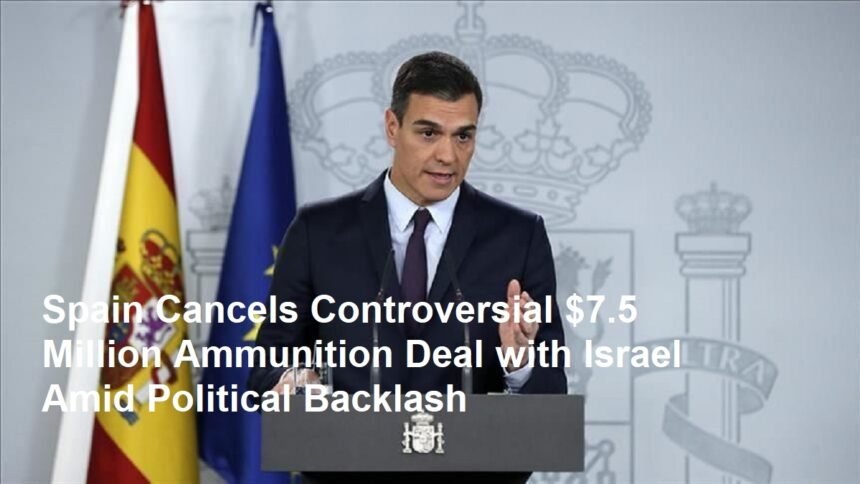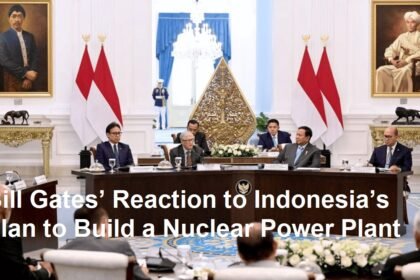MADRID, April 24, 2025 — Spain’s government announced on Thursday it has terminated a contentious €7 million ($7.5 million) agreement to purchase ammunition from Israel, citing ethical concerns and mounting domestic pressure over Israel’s military policies in the occupied Palestinian territories. The abrupt cancellation marks a significant shift in Spain’s defense procurement strategy and underscores growing European scrutiny of arms trade with Israel amid escalating violence in the Middle East.
Background of the Deal
The agreement, initially signed in late 2024, involved the acquisition of advanced artillery shells and small arms ammunition from Israel’s state-owned defense contractor, Israel Military Industries (IMI). The deal was part of Spain’s broader effort to replenish its military stockpiles following its commitment to supply Ukraine with artillery rounds in 2023. However, the partnership drew immediate criticism from Spanish left-wing coalitions, human rights groups, and pro-Palestine activists, who accused Prime Minister Yolanda Díaz’s government of indirectly funding Israel’s military operations in Gaza.
Political Pressure and Ethical Concerns
Spain’s progressive coalition government, led by the Socialist Workers’ Party (PSOE) and Sumar, faced intense backlash from its political base over the deal. Protests erupted in Madrid and Barcelona earlier this month, organized by groups such as the Palestine Solidarity Network, which branded the agreement “complicity in war crimes.” The controversy intensified after Israel’s April 2025 military offensive in Rafah, a southern Gaza city, which resulted in over 200 Palestinian civilian casualties, according to UN reports.
“We cannot, in good conscience, continue arms transactions with a nation whose actions violate international humanitarian law,” stated Spanish Defense Minister Margarita Robles during a press conference. She emphasized that the decision aligns with Spain’s “commitment to ethical arms trade principles” adopted in 2022, which prohibit weapon sales to countries engaged in human rights abuses.
Israel’s Reaction and Diplomatic Strain
The Israeli Foreign Ministry condemned the cancellation as “a politically motivated move that undermines bilateral trust.” IMI executives warned of potential legal action, arguing that Spain’s withdrawal breaches contractual obligations. The deal’s collapse also risks cooling diplomatic relations, which had improved in recent years following Spain’s participation in joint Mediterranean security initiatives.
Israeli Prime Minister Benjamin Netanyahu criticized Spain’s decision as “hypocritical,” noting that other EU nations, including Germany and Italy, continue to import Israeli defense technology. “Selective boycotts only embolden terrorist organizations,” he asserted during a televised address.
Domestic and International Implications
Domestically, the move is seen as a victory for Spain’s leftist factions, reinforcing Díaz’s alignment with progressive foreign policy goals. However, critics within Spain’s conservative opposition argue that the cancellation weakens national defense readiness. “This government prioritizes ideology over security,” said Alberto Núñez Feijóo, leader of the People’s Party (PP).
Internationally, Spain’s decision adds momentum to a burgeoning European debate over arms exports to Israel. Ireland and Norway recently passed non-binding resolutions urging EU-wide restrictions, while France and Germany remain divided on the issue. The EU’s High Representative for Foreign Affairs, Josep Borrell, acknowledged the “complex balancing act” between ethical trade and regional security partnerships.
Broader Context: Arms Trade Under Scrutiny
Spain’s reversal reflects a broader trend of Western nations reassessing defense ties with Israel. In 2024, the UN reported a 30% annual increase in Palestinian casualties from Israeli military operations, reigniting calls for arms embargoes. Human Rights Watch and Amnesty International have repeatedly accused Israel of using disproportionate force in Gaza, allegations Israel denies, citing self-defense against Hamas.
Meanwhile, Spain’s Defense Ministry announced it will seek alternative ammunition suppliers, likely turning to EU-based manufacturers like France’s Nexter or Germany’s Rheinmetall. Analysts suggest the shift could strain Spain’s defense budget, as European producers often charge premiums compared to Israeli contractors.
Looking Ahead
The cancellation underscores the escalating influence of ethical considerations in global arms trade. For Spain, the decision reinforces its diplomatic identity as a mediator in Middle Eastern conflicts, a role it has cultivated through advocacy for Palestinian statehood. Yet, it also exposes vulnerabilities in Europe’s defense supply chains, particularly as the Ukraine war depletes stockpiles.
As the EU grapples with unifying its stance on Israel, Spain’s move may inspire similar actions among member states. For now, the Díaz government’s gamble hinges on balancing moral imperatives with pragmatic security needs—a challenge that will define Spain’s defense strategy in an increasingly polarized world.









